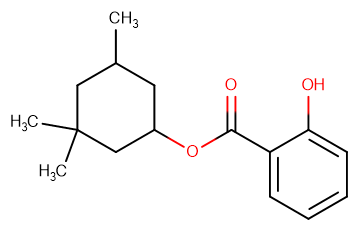
Homosalate
CAS No. 118-56-9
Homosalate( Homosalate )
Catalog No. M10630 CAS No. 118-56-9
Homosalate is an organic compound used in some sunscreens. It is an ester formed from salicylic acid and 3,3,5-trimethylcyclohexanol, a derivative of cyclohexanol.
Purity : >98% (HPLC)
 COA
COA
 Datasheet
Datasheet
 HNMR
HNMR
 HPLC
HPLC
 MSDS
MSDS
 Handing Instructions
Handing Instructions
| Size | Price / USD | Stock | Quantity |
| 50MG | 30 | In Stock |


|
| 100MG | 42 | In Stock |


|
| 200MG | 52 | In Stock |


|
| 500MG | Get Quote | In Stock |


|
| 1G | Get Quote | In Stock |


|
Biological Information
-
Product NameHomosalate
-
NoteResearch use only, not for human use.
-
Brief DescriptionHomosalate is an organic compound used in some sunscreens. It is an ester formed from salicylic acid and 3,3,5-trimethylcyclohexanol, a derivative of cyclohexanol.
-
DescriptionHomosalate is an organic compound used in some sunscreens. It is an ester formed from salicylic acid and 3,3,5-trimethylcyclohexanol, a derivative of cyclohexanol. Contained in 45% of U.S. sunscreens, it is used as a chemical UV filter.
-
In Vitro——
-
In Vivo——
-
SynonymsHomosalate
-
PathwayOthers
-
TargetOther Targets
-
RecptorOthers
-
Research Area——
-
Indication——
Chemical Information
-
CAS Number118-56-9
-
Formula Weight262.35
-
Molecular FormulaC16H22O3
-
Purity>98% (HPLC)
-
SolubilityDMSO: 55mg/mL
-
SMILESOC1=CC=CC=C1C(OC2CC(C)(C)CC(C)C2)=O
-
Chemical NameSalicylic acid, 3,3,5-trimethylcyclohexyl ester (8CI)
Shipping & Storage Information
-
Storage(-20℃)
-
ShippingWith Ice Pack
-
Stability≥ 2 years
Reference
1.Kim TH, et al. J Toxicol Environ Health A. 2014;77(4):202-13.
molnova catalog



related products
-
Norwogonin 5,7,8-tri...
Norwogonin 5,7,8-trimethyl ether is a natural product.
-
D-Gulonic acid γ-lac...
L-Gulonolactone (also known as reduced ascorbic acid RAA) is the substrate of the enzyme L-gulono-14-lactone oxidoreductase (EC 1.1.3.8) which catalyzes the last step of the biosynthesis of L-ascorbic acid (vitamin C) in plants and animals.
-
cis-2-Hydroxy 4-meth...
The herbs of Acanthopanax gracilistylus.



 Cart
Cart
 sales@molnova.com
sales@molnova.com


